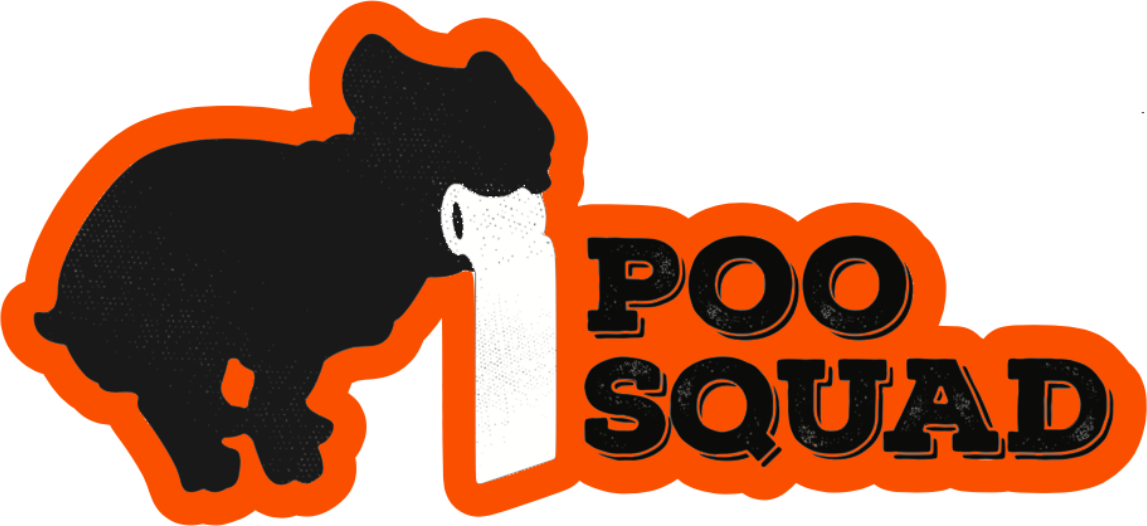Dogs eat poop for behavioral, medical, or instinctual reasons. It might be boredom, anxiety, poor digestion, or a sign of illness. While common, it’s not harmless, and may point to deeper issues. If it’s a habit or comes with symptoms, talk to your vet and monitor closely.
Yes, poop eating (coprophagia) is gross, but also surprisingly common. It doesn’t mean you’ve failed as a pet parent. From stress to nutrient gaps to leftover food in their stool, dogs have strange but explainable reasons. Understanding why is the first step toward fixing it.
How to stop your dog from eating poop:
- Digestive Enzyme Supplements: Some dogs simply don’t break down food well. Supplements like CoproBan or For-Bid can make poop less appealing by altering its taste or smell from the inside out.
- Switch to More Digestible Food: Cheap kibble often results in more “leftover nutrients” in the poop. Upgrading your dog’s diet (and increasing fiber) can reduce the temptation.
- Hydration Matters: A well-hydrated gut digests better. More water = fewer undigested bits = less reason to double dip.
- Pick Up More Often (or Let Us Do It): The longer poop sits around, the more likely your dog is to go back for a snack. We get it… After a long day at work, it’s the last thign you want to do.
Want to know what makes dogs eat poop, and more importantly, how to stop it?
Below, we break down every cause, from medical to emotional, and give you real fixes that work. If you’re tired of yelling “leave it,” you’re in the right place.
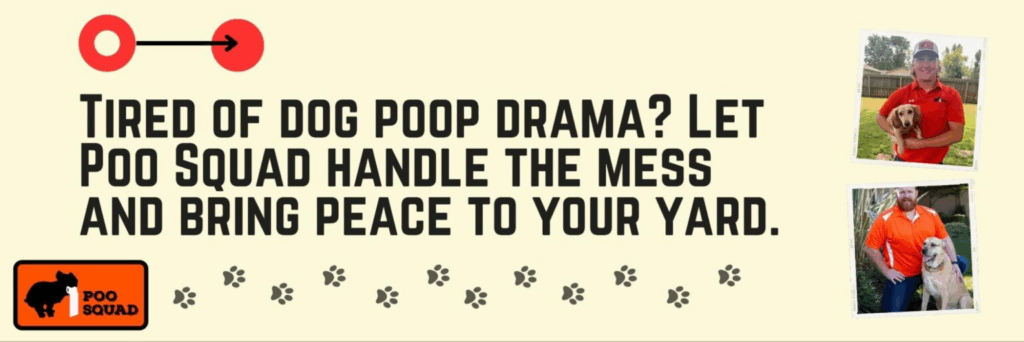
Is It Normal for Dogs to Eat Poop?
It’s one of those behaviors that makes you do a double take, but yeah, poop-eating is more common than you’d think. It’s not always a red flag. Sometimes, it’s just nature doing its thing.
Instinctual Behavior in Puppies and Moms
Let’s start with the basics. New mama dogs? They eat their puppies’ poop. It’s not gross to them, it’s protective. By cleaning up after their litter, they’re keeping the den safe from predators and bacteria.
And puppies?
Those little fur missiles are exploring everything with their mouths. Toys, shoes, your favorite blanket… and unfortunately, their own droppings. It’s a weird part of growing up, but it usually passes, usually.
Oh, and winter?
That’s peak “poopsicle” season. Something about frozen poop turns it into a crunchy backyard snack. I wish I was joking, but we see it all the time.
Breed Tendencies and Evolution
Certain breeds just lean into the weird stuff. Labs, terriers, and other working dogs seem to have a stronger drive to scavenge. Some of that goes back to survival instincts, sniffing out anything remotely edible when times were lean.
That scavenger switch doesn’t always shut off just because your dog sleeps on a memory foam bed now.
At Poo Squad, we’ve cleaned up after every kind of pooper, and believe me, some breeds are just more “adventurous” than others. If this behavior sticks around past the puppy stage, don’t panic, but do keep reading.
Medical Reasons Dogs Eat Poop (What Your Vet May Not Be Telling You)
Let’s get one thing straight, sometimes a dog chowing down on poop isn’t just quirky. It could be their body’s way of waving a red flag. And no, it doesn’t mean they’ve lost their minds. It might just mean something inside them is out of whack.
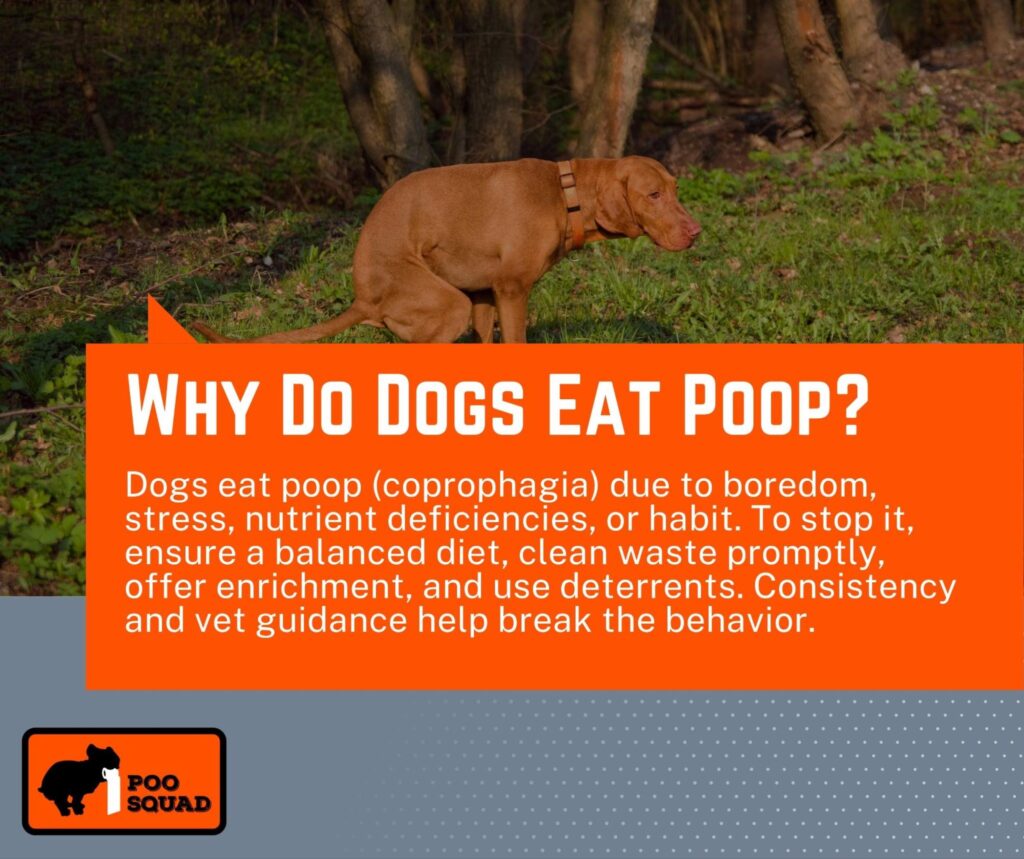
Nutrient Deficiencies & Poor Digestion
Dogs aren’t dumb. If they’re not getting what they need from their food, or not absorbing it properly, they’ll try to get it somewhere else… even if that somewhere else is, well, recycled.
This happens more often than you’d think with lower-quality dog food or even decent food that your pup’s gut just doesn’t vibe with. If your dog’s missing digestive enzymes or has a condition like EPI (Exocrine Pancreatic Insufficiency), they might go hunting through their own droppings looking for leftovers their body didn’t process the first time.
It’s gross, but it makes sense biologically.
Internal Parasites and Illnesses
Parasites?
They’re sneaky little thieves. Worms and other freeloaders can leech vital nutrients from your dog’s system, leaving them nutritionally bankrupt, and more likely to engage in poop patrol.
And it’s not just worms. Underlying health issues like diabetes, Cushing’s disease, or thyroid imbalances can shift your dog’s hunger patterns and metabolism. Some dogs start eating poop because their body’s signals are just plain confused.
Worried It’s Medical? You’re Not Alone
Totally fair concern. If your dog’s poop-eating habit starts suddenly, happens all the time, or comes with other signs like weight loss, fatigue, or even a change in coat, you should consider a vet panel. You don’t have to break the bank either. Start with a simple stool analysis or an enzyme panel. These tests can flag digestive or parasitic issues fast.
We’re not vets, but we do see poop every day. That’s why our Dog Poop Report Card exists, to give pet parents a heads-up when something doesn’t look right. Because if you’re not seeing the poop, you might be missing the clues.
Behavioral Reasons Dogs Eat Poop
Dogs are weird little emotional sponges. They watch us more closely than we think, and sometimes, their odd behaviors have less to do with biology and more to do with their environment… or ours.
Boredom, Stress, and Anxiety
If your dog’s chewing poop like it’s a snack, and they’re alone most of the day? That’s not coincidence, it’s coping.
Long periods without stimulation can turn a normally chill pup into a poop connoisseur. It’s one part boredom, one part stress release. And dogs with separation anxiety? They’re even more prone to weird behaviors when you’re not around.
Heard this one before?
My dog ONLY eats poop when I’m not home.”
Classic anxiety response. Not your fault, but definitely your clue.
Emotional Mirroring & Household Dynamics
Here’s something we don’t talk about enough: our dogs feel our stress. If the humans in the house are constantly bickering about whose turn it is to pick up the yard, your dog picks up on that tension. They can’t solve the problem, so they act out, sometimes by eating what you’re avoiding.
We’ve even had customers tell us that hiring Poo Squad actually stopped the behavior. Once the backyard drama was gone, so was the stress-triggered poop snacking.
Frustration and Learned Habits
Some dogs figure out that eating poop gets a reaction, whether it’s shock, yelling, or chasing. If they’re lacking attention or stimulation, any response might feel like a win.
Others eat poop to avoid punishment, especially if they were scolded for having accidents as puppies. That shame-conditioning can linger, especially in dogs who came from puppy mills, over-crated environments, or homes with heavy discipline.
The good news?
These behaviors can be unlearned with a little compassion and a lot of consistency. But understanding why it’s happening is your first step.
Sensory Reasons: Dogs Actually Like the Smell (Gross but True)
Look, dogs sniff butts for a living. Their idea of a “scent profile” is… different than ours.
So when it comes to poop? Some of them genuinely think it smells amazing.
Cat Poop = Protein Party
Cat poop is like fine dining for dogs, dense, high-protein, and straight from a meat-based diet. If you’ve got a litter box in the house or your neighbor’s cat uses your flower bed, chances are your dog sees it as a snack buffet.
It’s not personal. It’s just biology.
Poopsicles: A Winter Delicacy
We wish we were kidding, but frozen poop becomes a crunchy seasonal treat. Something about the texture change (and maybe the “fresh from the freezer” vibe) turns it into a gross but irresistible chew toy for some dogs.
We’ve had Poo Squad techs tell us they literally see dogs waiting by the patio door for that first snow like it’s poop Christmas.
Undigested Goodies
If your dog is on a raw diet, or just eats fast, they might not be fully breaking down all their food. Bits of undigested meat or kibble in their stool make it smell like leftovers to them.
In their mind, it’s not “waste.” It’s round two.
We’ve flagged many cases where clients didn’t even realize their dogs weren’t digesting properly until they saw consistent patterns in their poop pickups. It’s not glamorous, but it’s surprisingly useful.
Risks of Coprophagia: Is It Dangerous?
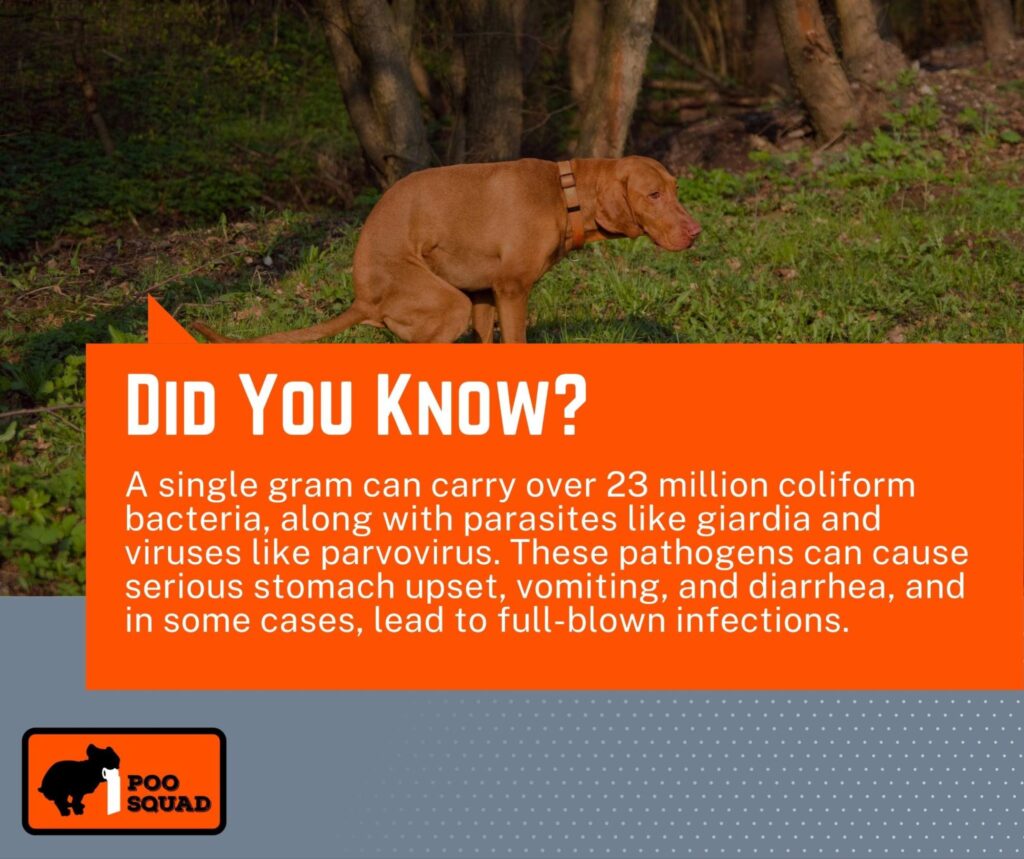
If your dog’s been dabbling in backyard snacks, you’re probably wondering, “Is this just gross, or actually dangerous?” The short answer? Both.
Health Hazards
A single gram can carry over 23 million coliform bacteria, along with parasites like giardia and viruses like parvovirus. These pathogens can cause serious stomach upset, vomiting, and diarrhea, and in some cases, lead to full-blown infections.
Oh, and don’t forget about dental disease. Dogs that regularly snack on stool are at a much higher risk for oral health problems. If their breath could clear a room, this might be why.
And yes, some of that bacteria ends up on their tongue, then on your face. Let that sink in.
The Social Fallout Is Real
Now for the emotional side of this little habit.
One dog parent recently said:
How do I stop my toddler from seeing the dog eat poop?
That’s not just a hygiene worry, it’s a parenting panic attack. And they’re not alone.
We’ve worked with customers who were mortified when their dinner guests watched their golden retriever wolf down a backyard “treat.” Others confessed they stopped using their yard entirely because they didn’t want neighbors to see.
It’s easy to spiral into self-doubt.
Am I lazy? Am I failing as a pet owner?
Nope. You’re not. You’re dealing with a behavior that’s common, complex, and fixable. And hey, that’s why Poo Squad exists. To take this one headache off your plate (so it doesn’t end up on your dog’s).
How to Tell If It’s a Problem (Or Just a Phase)
Not every dog that munches on poop needs a therapist or a vet visit. Sometimes, it’s just a weird little phase. But sometimes? It’s a red flag.
Here’s how to tell the difference.
Is This New or Has It Been Happening for Months?
A dog who suddenly starts eating poop out of nowhere, that’s worth paying attention to. Sudden changes often signal something deeper, especially if there are other symptoms like:
- Weight loss
- Diarrhea
- Changes in appetite
- Lethargy or strange behavior
If it’s a chronic thing your pup’s done since puppyhood (especially with no health issues), it may be behavioral and easier to manage with training.
Is Your Dog Alone a Lot?
Many of our Poo Squad clients mention they work long hours or their dog spends a lot of time unsupervised. That combo, plus lack of stimulation, can lead to all kinds of odd habits, including coprophagia.
Also: dogs that eat too fast or don’t chew their food well often produce poop that still smells “edible” to them. A slow-feeder bowl might help.
Poo Squad Insight
Here’s something most dog owners never think about: if you’re not picking up your dog’s poop yourself, you’re not seeing what’s going on inside their body.
That’s why our Dog Poop Report Card exists. It’s our way of flagging things like mucus, diarrhea, or undigested food that might otherwise go unnoticed. We’ve had clients catch major health issues early, just from those quiet little updates we send after each visit.
So no, noticing poop-eating behavior isn’t gross, it’s smart. And paying attention can literally save your dog’s life.
How to Stop a Dog From Eating Poop (Backed by Experts)
There’s no magic button to make coprophagia disappear overnight, but that doesn’t mean you’re stuck. Tackling it from a few angles, medical, behavioral, and emotional, can make a massive difference. Here’s how.
Medical & Dietary Fixes
Let’s start with the inside.
- Digestive Enzyme Supplements: Some dogs simply don’t break down food well. Supplements like CoproBan or For-Bid can make poop less appealing by altering its taste or smell from the inside out.
- Switch to More Digestible Food: Cheap kibble often results in more “leftover nutrients” in the poop. Upgrading your dog’s diet (and increasing fiber) can reduce the temptation.
- Hydration Matters: A well-hydrated gut digests better. More water = fewer undigested bits = less reason to double dip.
Pro Tip: If your dog’s eating poop that still looks like food, try softening meals with water or bone broth to aid digestion.
Training & Environmental Tweaks
Sometimes, it’s just about creating better habits (and removing bad options).
- Teach “Leave It” Early: This command is gold. Use it any time your dog approaches waste, yours or another dog’s, and reward them when they walk away.
- Walk With Control: If your pup’s a ninja-poop-eater on walks, consider using a leash short enough to redirect, or even a muzzle if it’s constant. No shame, just smart prevention.
- Remove Temptation: This is where we shine. One of the fastest ways to curb poop-eating is simply removing it before they get the chance. That’s why so many customers use our scooping services as a training tool. Fewer opportunities = faster behavior correction.
Emotional Support Tools
Boredom and loneliness drive a lot of weird dog behaviors.
- Puzzle Toys & Brain Games: If your dog has time to go find poop, they’ve got time to solve a treat maze. Redirect the energy.
- Timed Treat Dispensers: For dogs left alone all day, devices that drop kibble or treats at intervals can keep them engaged (and out of trouble).
Social Reinforcement at Home
Everyone in the house needs to be on the same plan.
- Positive > Punishment: Scolding after the fact rarely works, and can even make the behavior worse. Instead, catch and reward them for not eating poop.
- Family-Wide System: Set up a shared calendar for scoop duties. Keep the backyard clear. And if you’re tired of the “whose turn is it?” drama, outsource it. We’ve had families tell us Poo Squad literally saved their marriage over this.
Want the behavior to stop? Start by taking away the buffet.
Let our team keep your yard poop-free, so you can focus on bonding with your dog, not yelling “leave it” every five minutes.
To schedule service, first, find your location for weekly cleanups or just a one-time reset. Either way, we’ll help put this crappy chapter behind you.
Stories From the Field (Poo Squad Experience)
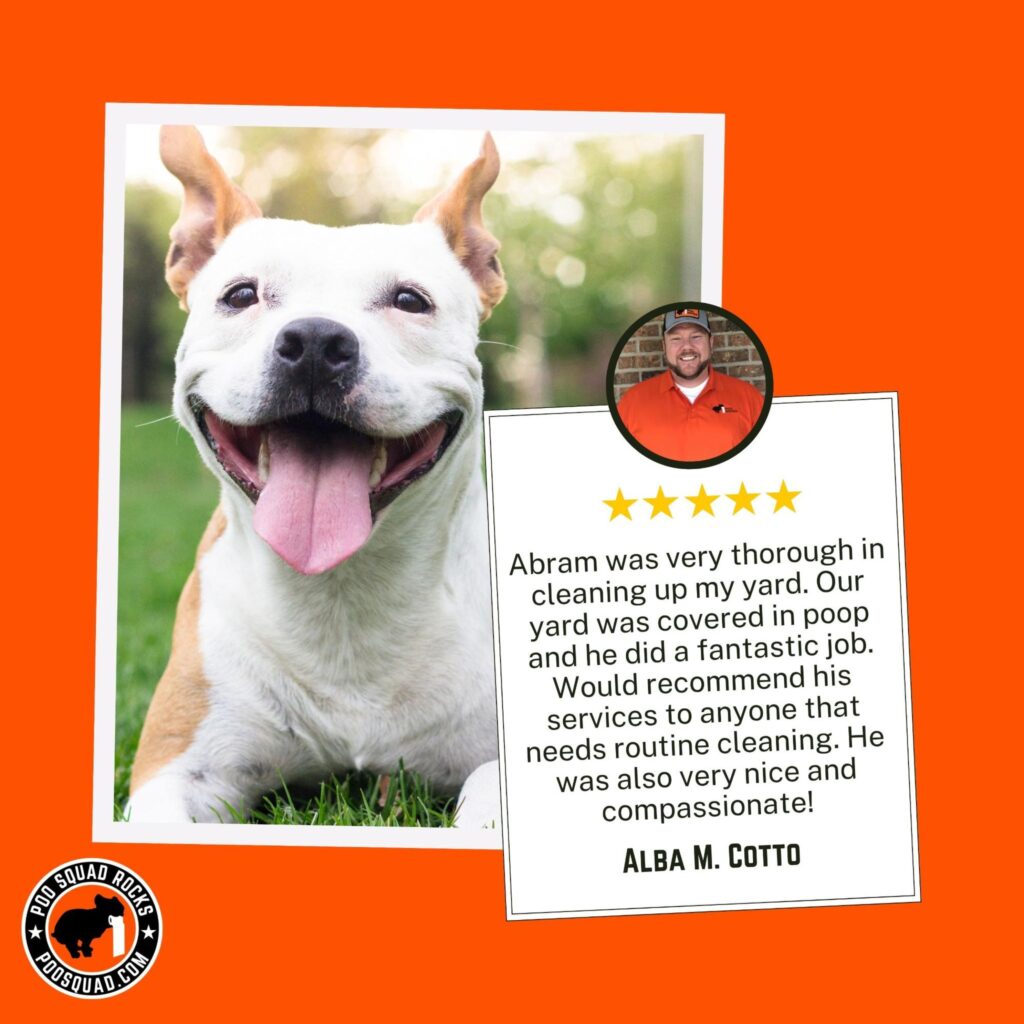
You don’t scoop thousands of yards without seeing some… let’s call it creative digestion. But behind every “eww” is a family, a struggle, and a chance to help.
“Pudding Pups” & The Avoiders
We’ve seen dogs with chronic diarrhea (what we call “Pudding Pups”) sneak back to eat their own poop, not because they enjoy it, but to avoid getting in trouble. This behavior is more about anxiety than appetite. When you remove the evidence, they feel safer. That’s why cleanups are more than just clean, they’re compassionate.
Poocasso Dogs: The Crayon Connoisseurs
Then there’s the Poocasso. These dogs don’t just eat poop, they create masterpieces. We’ve scooped rainbow piles thanks to crayons, towels, and the occasional Barbie shoe. It’s hilarious until you realize it might signal a dog who’s anxious, bored, or in need of safer chew options. That’s insight you can only get when you’re looking closely.
Saved Marriages (No, Really)
One mom told us that poop pickup was the last straw in her marriage. The arguments, the finger-pointing, who forgot, who stepped in it, gone once Poo Squad stepped in. She emailed us later: “I’m not joking when I say you saved our marriage.” We’re not therapists, but hey, we’ll take the win.
Senior Citizens & the Scoop Struggle
We also serve a growing number of older clients and folks with mobility issues. They love their dogs but struggle to keep up with the mess. Coprophagia becomes more likely simply because the poop piles up. Our service gives them dignity, safety, and a cleaner yard without the physical toll.
If your dog’s eating habits are stressing you out, or just stressing your marriage, we’re here, in bright orange, ready to help.
Start service now or check your local squad.
5 Coprophagia Myths That Need to Die
If we had a dollar for every time a new client quoted one of these, we’d be rolling in cash (instead of something else). Let’s set the record straight, because poop eating might be common, but it’s not something you should ignore.
1. “It’s just a phase, they’ll grow out of it.”
Sometimes they do. But sometimes they don’t. We’ve worked with four-year-old Labs who still sneak bites behind the hydrangeas. If the behavior’s been around longer than a few months, it’s time for a plan.
2. “Only gross, lazy owners have poop-eating dogs.”
Nope. Some of the most meticulous dog owners we’ve ever met still deal with this. You can feed premium kibble, walk them twice a day, and still find them face-deep in a pile. This isn’t about laziness, it’s about biology, stress, or instinct. Blame the wiring, not yourself.
3. “It’s harmless.”
Not quite. One gram of dog poop can contain over 23 million bacteria. That’s not just gross, it’s a serious health risk, especially for dogs with weak immune systems or families with kids.
4. “I’ll just add pineapple to their food.”
Tried it? Didn’t work? You’re not alone. While pineapple can help in rare cases, it’s no magic bullet. If the root issue is boredom, anxiety, or digestion, all the fruit in the world won’t fix it.
5. “My dog’s just weird.”
Actually, your dog’s pretty typical. Coprophagia affects up to 24% of dogs at some point in their lives. It’s more common than you think, and totally manageable once you know what’s driving it.
Want help handling the mess (literally)?
Let Poo Squad scoop for you while you retrain the behavior.
Book your first clean-up today and leave the poop-eating problems behind, where they belong.
Why Poo Squad Notices Poop Behavior Before You Do
Let’s be honest, most folks aren’t getting down on all fours to examine their dog’s business. And we don’t blame you. But that’s where Poo Squad comes in.
Dog Poop Report Cards
Every visit, we’re scanning for changes in color, texture, or frequency. Diarrhea? Mucus? Grass? We’ve seen it all, and we flag it. Irregular poop is often the first sign something’s off, and our report cards help pet parents catch issues early, sometimes before their vet does.
People Watching Real Behavior
Most clients admit they’ve never really looked at their dog’s poop. We have. Thousands of times. It’s not glamorous, but it’s what makes us different. We don’t just scoop, we observe. That’s the Poo Squad advantage.
Poop is data. And with the right team paying attention, it can be the difference between a healthy pup and an expensive vet visit..
You’re Not a Bad Owner, But It’s Time to Take Action
If your dog’s been dining on doodoo, don’t panic, and definitely don’t beat yourself up. Coprophagia is way more common than people admit. It’s also one of those behaviors that, while gross, almost always has a reason behind it.
Maybe your pup’s not absorbing nutrients. Maybe they’re bored. Maybe they just think it’s a snack (yep, we’ve seen it). Whatever the cause, one thing’s for sure: your dog is trying to tell you something. It’s up to us to listen, and act.
- Talk to your vet.
- Look at diet, stress, and routine.
- And if cleaning it up is half the battle, let us help with that too.
At Poo Squad, we take a lot of crap, literally, but we also take pride in helping dog parents find peace of mind. Whether it’s spotting a “pudding pup,” flagging a health concern, or just saving your Saturday from being ruined by backyard surprises, we’re here for it.
You’re not a bad owner. You’re just ready to scoop smarter.
